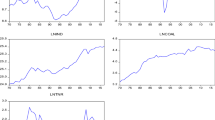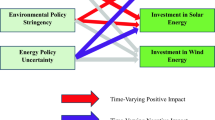Abstract
The current study is aimed at investigating the relationship between the use of renewable energy, the rate of currency exchange, and the rate of inflation with the ARDL model. The findings of the ECM show that in the long run, a bidirectional association between exchange rate and renewable energy exists in Brazil. This shows that the rate of currency exchange affects the use of renewable energy, and the use of renewable energy affects the rate of currency exchange. The inflation rate also affects renewable energy and exchange rate in the long run. The rate of adjustment to equilibrium is also below 50%, indicating that it will take a long time to adjust to long-run equilibrium. In the short run, we ascertain that renewable energy use has a significant negative effect on the rate of currency exchange, showing that a rise in the use of renewable energy significantly causes the exchange rate to appreciate. The long-run results show that renewable energy use negatively impacts exchange rate (appreciation), while the inflation rate and rate of currency exchange significantly affect the use of renewable energy positively. Thus, in addition to lowering carbon dioxide emissions and global warming effects, renewable energy use also facilitates an improvement in the currency’s value. Therefore, the use of renewable energy should be promoted, and nations should shift to the use of renewable energy. This will also promote zero carbon in the future.






Similar content being viewed by others
References
Akintande OJ, Olubusoye OE, Adenikinju AF, Olanrewaju BT (2020) Modeling the determinants of renewable energy consumption: evidence from the five most populous nations in Africa. Energy 206:117992
Becker B, Fischer D (2013) Promoting renewable electricity generation in emerging economies. Energy Policy 56:446–455
Bourcet C (2020) Empirical determinants of renewable energy deployment: a systematic literature review. Energy Econ 85:104563
Chen C, Pinar M, Stengos T (2020) Renewable energy consumption and economic growth nexus: evidence from a threshold model. Energy Policy 139:111295
Chica-Olmo J, Sari-Hassoun S, Moya-Fernández P (2020) Spatial relationship between economic growth and renewable energy consumption in 26 European countries. Energy Econ 92:104962
Da Silva PP, Cerqueira PA, Ogbe W (2018) Determinants of renewable energy growth in Sub-Saharan Africa: evidence from panel ARDL. Energy 156:45–54
Deka A, Dube S (2021) Analyzing the causal relationship between exchange rate, renewable energy and inflation of Mexico (1990–2019) with ARDL bounds test approach. Renew Energy Focus 37:78–83. https://doi.org/10.1016/j.ref.2021.04.001
Dickey DA, Fuller WA (1979) Distribution of the estimators for autoregressive time series with a unit root. J Am Stat Assoc 74(366a):427–431
Dietz T, Rosa EA, York R (2012) Environmentally efficient well-being: is there a Kuznets curve? Appl Geogr 32(1):21–28
Engle RF, Granger CW (1987)Co-integration and error correction: representation, estimation, and testing. Econometrica 55:251–276
Eren BM, Taspinar N, Gokmenoglu KK (2019) The impact of financial development and economic growth on renewable energy consumption: empirical analysis of India. Sci Total Environ 663:189–197
Filippidis M, Tzouvanas P, Chatziantoniou I (2021) Energy poverty through the lens of the energy-environmental Kuznets curve hypothesis. Energy Econ 105328:105328
Fisher I (1930) Theory of interest: as determined by impatience to spend income and opportunity to invest it. Augustusm Kelly Publishers, Clifton
Ge Y, Zhi Q (2016) Literature review: the green economy, clean energy policy and employment. Energy Procedia 88:257–264
Granger CW (1986) Developments in the study of cointegrated economic variables. In: Oxford Bulletin of economics and statistics
Grossman G, Krueger A (1995) Economic growth and the environment. Q J Econ 110:353–377
Ivanovski K, Hailemariam A, Smyth R (2020) The effect of renewable and non-renewable energy consumption on economic growth: non-parametric evidence. J Clean Prod 286:124956
Keele L, DeBoef S (2008) Taking time seriously: dynamic regression. Am J Polit Sci 52(1):184–200
Kuznets S (1955) Economic growth and income inequality. Am Econ Rev 45(1):1–28
Li J, Zhang X, Ali S, Khan Z (2020)Eco-innovation and energy productivity: new determinants of renewable energy consumption. J Environ Manag 271:111028
Lin B, Zhu J (2019) Determinants of renewable energy technological innovation in China under CO2 emissions constraint. J Environ Manag 247:662–671
Ma X, Ahmad N, Oei PY (2021) Environmental Kuznets curve in France and Germany: role of renewable and nonrenewable energy. Renew Energy 172:88–99
Narayan PK (2005) The saving and investment nexus for China: evidence from cointegration tests. Appl Econ 37(17):1979–1990
Omri A, Nguyen DK (2014) On the determinants of renewable energy consumption: international evidence. Energy 72:554–560
Papież M, Śmiech S, Frodyma K (2018) Determinants of renewable energy development in the EU countries. A 20-year perspective. Renew Sust Energ Rev 91:918–934
Pesaran, M. H., Shin, Y., & Smith, R. P. (1997). Pooled estimation of long-run relationships in dynamic heterogeneous panels.
Pesaran MH, Shin Y, Smith RP (1999) Pooled mean group estimation of dynamic heterogeneous panels. J Am Stat Assoc 94(446):621–634
Pesaran MH, Shin Y, Smith RJ (2001) Bounds testing approaches to the analysis of level relationships. J Appl Econ 16(3):289–326
Phillips PC, Perron P (1988) Testing for a unit root in time series regression. Biometrika 75(2):335–346
Rahman MM, Velayutham E (2020) Renewable and non-renewable energy consumption-economic growth nexus: new evidence from South Asia. Renew Energy 147:399–408
Salim RA, Rafiq S (2012) Why do some emerging economies proactively accelerate the adoption of renewable energy? Energy Econ 34(4):1051–1057
Selden TM, Song D (1994) Environmental quality and development: is there a Kuznets curve for air pollution emissions? J Environ Econ Manag 27:147–162
Shafik N (1994) Economic development and environmental quality: an econometric analysis. In: Oxford economic papers, pp 757–773
Shahbaz M, Raghutla C, Chittedi KR, Jiao Z, Vo XV (2020) The effect of renewable energy consumption on economic growth: evidence from the renewable energy country attractive index. Energy 207:118162
Smolović JC, Muhadinović M, Radonjić M, Đurašković J (2020) How does renewable energy consumption affect economic growth in the traditional and new member states of the European Union? Energy Rep 6:505–513
Stern DI, Common MS, Babbier EB (1996) Economic growth and environmental degradation. World Dev 24:1151–1160
Wang Q, Wang L (2020) Renewable energy consumption and economic growth in OECD countries: A nonlinear panel data analysis. Energy 207:118200
Zhao P, Lu Z, Fang J, Paramati SR, Jiang K (2020) Determinants of renewable and non-renewable energy demand in China. Struct Chang Econ Dyn 54:202–209
Saidi K, Omri A (2020) The impact of renewable energy on carbon emissions and economic growth in 15 major renewable energy-consuming countries. Environ Res 186:109567
Availability of data and materials
The data used in this paper is secondary data and were retrieved from the Organization for Economic Co-operation and Development (OECD) website, www.oecd.org.
Author information
Authors and Affiliations
Contributions
AD: conceptualization, methodology, writing – original draft, software. BC: data curation, writing – review and editing, supervision. SD: visualization, investigation.
Corresponding author
Ethics declarations
Ethics approval
Not applicable
Consent to participate
Not applicable
Consent for publication
The authors guarantee that this manuscript has not been previously published in other journals and is not under consideration by other journals. The authors also guarantee that this manuscript is original and is their own work.
Competing interests
The authors declare no competing interests.
Additional information
Responsible Editor: Nicholas Apergis
Publisher’s note
Springer Nature remains neutral with regard to jurisdictional claims in published maps and institutional affiliations.
Rights and permissions
About this article
Cite this article
Deka, A., Cavusoglu, B. & Dube, S. Does renewable energy use enhance exchange rate appreciation and stable rate of inflation?. Environ Sci Pollut Res 29, 14185–14194 (2022). https://doi.org/10.1007/s11356-021-16758-2
Received:
Accepted:
Published:
Issue Date:
DOI: https://doi.org/10.1007/s11356-021-16758-2




